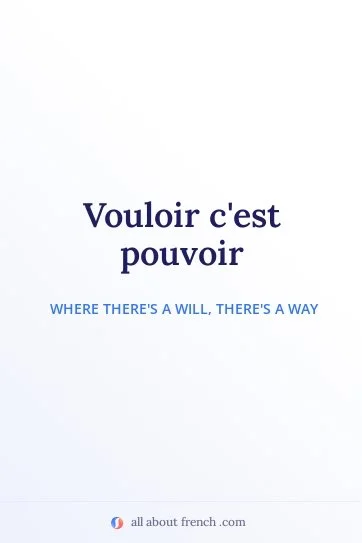
You are going to find out everything you have to know about the inspirational proverb "Vouloir c'est pouvoir". This include a detailed explanation of what it is and how to use it in a casual conversation with an audio example. As well as the cool things we added like dialogue example, synonym, slow pronunciation audio and more!
Translation : Where there's a will, there's a way
Literal meaning : To want, is to be able
Register : Neutral - Inspirational
Slow
Normal
IPA : / vulwaʁ sɛ puvwaːʁ. /

This is one of the simplest and most popular French sayings, claiming that when we really want something, we can reach it.
This popular proverb expresses the idea that a powerful will is all we need to achieve our goals. That the only barrier between us and our goals is how much we want it.
This proverb is mostly supposed to be a personal mantra, a guideline to keep you motivated. But you can also use it during a conversation, for example, to motivate a friend or a relative: "N'oublie pas que vouloir c'est pouvoir" ("Don't forget that to want is to be able") or "N'abandonne pas, vouloir c'est pouvoir" ("Don't give up, to want is to be able").
We generally attribute this proverb and the variations below to Napoléon Bonaparte. Even though they became so common that we tend to forget it.
↓ Example in a story with slow French audio ↓
Finally, let's see an example in a parallel story with slow audio.
Pourquoi est-elle en colère ?
Why is she mad?
10%
The story just started!
Get full access to 365 texts and quizzes, including this one.
 Discover more
Discover more Already a member? Full story and quiz here.
